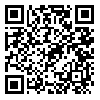Volume 33, Issue 1 (3-2024)
JGUMS 2024, 33(1): 32-41 |
Back to browse issues page
Research code: ۱۴۰۰۰۶۲۲۱۸
Ethics code: IR.GUMS.REC.1400.495
Download citation:
BibTeX | RIS | EndNote | Medlars | ProCite | Reference Manager | RefWorks
Send citation to:



BibTeX | RIS | EndNote | Medlars | ProCite | Reference Manager | RefWorks
Send citation to:
Rouhi Balasi L, Shafaati Shamami H, Alizadeh A, Pasandidehfar S, Makhsoos M, Gholami A. Professional Nursing Autonomy and Safe Nursing Care in Newly Graduated Nurses Working in Emergency Departments. JGUMS 2024; 33 (1) :32-41
URL: http://journal.gums.ac.ir/article-1-2644-en.html
URL: http://journal.gums.ac.ir/article-1-2644-en.html
Leila Rouhi Balasi1 

 , Hasan Shafaati Shamami *2
, Hasan Shafaati Shamami *2 

 , Ali Alizadeh2
, Ali Alizadeh2 

 , Sadegh Pasandidehfar2
, Sadegh Pasandidehfar2 

 , Mojtaba Makhsoos2
, Mojtaba Makhsoos2 

 , Ahmad Gholami3
, Ahmad Gholami3 




 , Hasan Shafaati Shamami *2
, Hasan Shafaati Shamami *2 

 , Ali Alizadeh2
, Ali Alizadeh2 

 , Sadegh Pasandidehfar2
, Sadegh Pasandidehfar2 

 , Mojtaba Makhsoos2
, Mojtaba Makhsoos2 

 , Ahmad Gholami3
, Ahmad Gholami3 


1- Department of Nursing, Faculty of Nursing and Midwifery, Guilan University of Medical Sciences, Rasht, Iran.
2- Department of Nursing, Student Research Committee, Guilan University of Medical Sciences, Rasht, Iran.
3- Department of Chemistry, Faculty of Basic Sciences, Rasht Branch, Islamic Azad University, Rasht, Iran.
2- Department of Nursing, Student Research Committee, Guilan University of Medical Sciences, Rasht, Iran.
3- Department of Chemistry, Faculty of Basic Sciences, Rasht Branch, Islamic Azad University, Rasht, Iran.
Abstract: (1944 Views)
Background It is necessary to provide safe care for patients with acute and life-threatening conditions by nurses working in the emergency departments (EDs). These nurses need higher levels of independent performance. Therefore, the competency to provide safe care and having professional nursing autonomy in novice nurses working in the EDs are very important.
Objective The purpose of this study was to determine the relationship between professional nursing autonomy and safe nursing care in newly graduated nurses working in the EDs.
Methods In this analytical cross-sectional study, the study population consists of all newly graduated nurses working in EDs of hospitals in Guilan, Iran. They all were included in the study using a census sampling method. The tools for collecting information were a demographic form, the assessment of safe nursing care questionnaire, and the professional nursing autonomy scale. Descriptive and inferential statistics (independent t-test, Spearman or Pearson correlation test, and linear regression analysis) were used to analyze the collected data.
Results There was a significant relationship between professional nursing autonomy and safe nursing care; for every one unit increase in professional autonomy, the chance of providing safe nursing care increases by 0.133 (P=0.009).
Conclusion The significant relationship of professional nursing autonomy with safe nursing care among the EDS nurses shows that if nurses have a greater control over their performance, decision-making ability, and autonomy to act based on patient safety, they can provide better quality care to patients. Therefore, empowering nurses by providing conditions to perform based on professional autonomy, can ultimately lead to better results for the patients and cause overall safety in the EDs.
Objective The purpose of this study was to determine the relationship between professional nursing autonomy and safe nursing care in newly graduated nurses working in the EDs.
Methods In this analytical cross-sectional study, the study population consists of all newly graduated nurses working in EDs of hospitals in Guilan, Iran. They all were included in the study using a census sampling method. The tools for collecting information were a demographic form, the assessment of safe nursing care questionnaire, and the professional nursing autonomy scale. Descriptive and inferential statistics (independent t-test, Spearman or Pearson correlation test, and linear regression analysis) were used to analyze the collected data.
Results There was a significant relationship between professional nursing autonomy and safe nursing care; for every one unit increase in professional autonomy, the chance of providing safe nursing care increases by 0.133 (P=0.009).
Conclusion The significant relationship of professional nursing autonomy with safe nursing care among the EDS nurses shows that if nurses have a greater control over their performance, decision-making ability, and autonomy to act based on patient safety, they can provide better quality care to patients. Therefore, empowering nurses by providing conditions to perform based on professional autonomy, can ultimately lead to better results for the patients and cause overall safety in the EDs.
Review Paper: Research |
Subject:
General
Received: 2023/09/9 | Accepted: 2023/11/12 | Published: 2024/04/1
Received: 2023/09/9 | Accepted: 2023/11/12 | Published: 2024/04/1
| Rights and permissions | |
 |
This work is licensed under a Creative Commons Attribution-NonCommercial 4.0 International License. |






